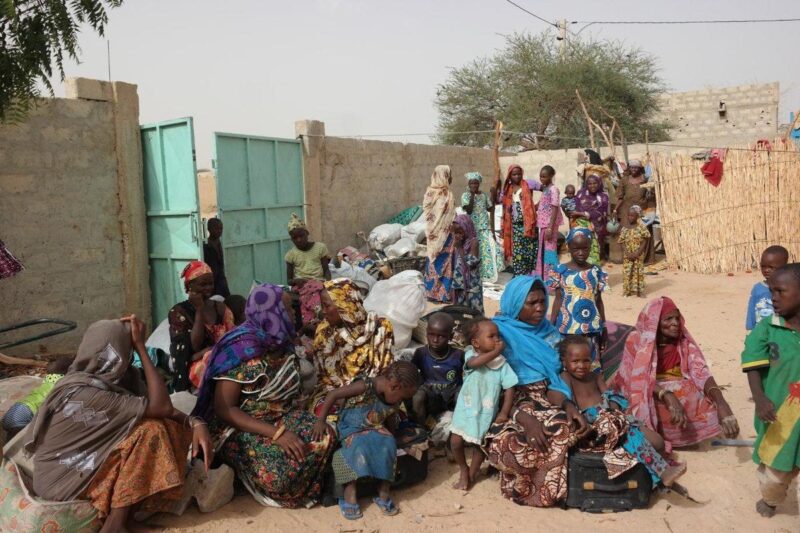Refugees beg Borno State governor Babagana Umara Zulum to keep his promise to repatriate them soon
Starving Nigerian refugees in Chad – most of whom are eating grass to survive – are begging the governor of Borno State to help them to return home.
The refugees – mostly from Doron Baga in the Kukawa Local Government Area – say governor Babagana Umara Zulum visited them in April last year and promised to repatriate them within 18 months.
But he has so far not kept his word, they say.
The refugees fled from Doron Baga 10 years ago to escape persistent, vicious and often deadly attacks by Jamā’at Ahl as-Sunnah lid-Da’way Wa’l-Jihād (JAS), better known as Boko Haram, insurgents.
They were banking on Zulum to keep his word but now, they say, they are stuck in Chad and cannot afford to return home.
When RNI visited Dar es Salam refugee camp on the banks of Lake Chad in the town of Baga Sola on Wednesday this week, the refugees said they were starving and only surviving by eating grass.
There are at least 20,000 people taking refuge in the camp.
Ra’is Deby said: “Our situation here is really traumatising and extremely disturbing. Please tell our governor to repatriate us to Baga.
“There are more than 20, 000 Nigerians taking refuge in the camp and we are all starving. The last time when we received food assistance was three months ago.”
Hauwa Idi, a middle-aged widow and mother of four, said: “The single mothers here are really suffering because we do not have a man to fend for us.
“We mostly boil water before we go to bed to keep our stomachs warm. We do not have any food. Most of the time we boil Leptadenia [a plant found in the Lake Chad Basin region]. That is the only way we can survive. We boil the grass and eat it. Please tell the authorities in the Borno State government that they need to come to our aid urgently. We cannot continue to live like this.”
A refugee, who asked to remain anonymous, told RNI there was a rumour circulating that some humanitarian aid organisations were sabotaging the government’s efforts to repatriate them.
“That’s not true. No one has stopped us from returning home. We are free to return but some humanitarian aid workers told us that there are still acts violence occurring back home. The insecurity remains. It is troubling our people back home.”
Babagana Alkali confirmed that the refugees were eating grass to survive.
“It’s true. We eat Leptadenia. Even this morning – that was what I had for breakfast.
“If you walk to the outskirts of town, you will see many children with sacks. They are searching for Leptadenia. They sometimes sell it to the adult refugees, especially to those who do not have children.”
Mustapha Grema Kolomi said he was grateful to Radio Ndarason for visiting the camp to find out about the refugees’ living conditions.
“I am extremely grateful that you came to visit. You can see with your own eyes the challenges we face every day. We are starving and living in poverty. We would love to go home but we cannot afford it.
“We look and feel like the survivors of a long war, which is really what we are. Many of us are sick. Every day you hear of refugees falling ill with high blood pressure. A lot of people have suffered strokes. People faint almost every day. When someone collapses, we rush them to the closest hospital. Some of the cases turn out to be fatal; some recover. We are desperate to get home.”
In April last year Zulum told refugees: “I have seen your condition and by the grace of God we will start resettling you back to your various homes. But you have to bear with us because we cannot resettle more than 20,000 people in one day. It will take a while before we resettle all of you.
“God’s grace, we will start the repatriation in April or May [2023] and in less than one-and-half years we will complete your resettlement.”
Almost a year has passed and not a single person from Chad has been repatriated, the refugees said.
“The governor came last year. He made the same promises then that he made the year before that. All we ask is that he keeps his word,” Alhaji Gambo Umara said.
Kaka Hajja Abatcha said: “By the grace of God it will not take more than two months before we all return to our homes. The governor saw how we were living. He told us categorically that he would repatriate us in the next one or two months.”
Leptadenia reticulata is a traditional medicinal plant species widely used to treat various ailments, such as tuberculosis, hematopoiesis, emaciation, coughs, dispnea, fever, burning sensations, night blindness, cancer and dysentery.
AYSHA MUSTAPHA KOLOMI









